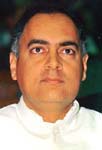The Rediff Special/ B M Oza
In the Bofors scandal, if Rajiv Gandhi was the prime suspect, the PMO was the prime tool
 The long saga of the still continuing and still unfolding Bofors scandal, has been a chapter of our national shame and trauma. In fact, since Bofors several other and bigger scandals have surfaced involving politicians and bureaucrats. Clearly, the quality of our public life has gone down. The growing nexus between politicians and bureaucrats is as disturbing as it is ugly. Why? What are the reasons? What is the way out? Taking Bofors as a case study one can examine this phenomenon.
The long saga of the still continuing and still unfolding Bofors scandal, has been a chapter of our national shame and trauma. In fact, since Bofors several other and bigger scandals have surfaced involving politicians and bureaucrats. Clearly, the quality of our public life has gone down. The growing nexus between politicians and bureaucrats is as disturbing as it is ugly. Why? What are the reasons? What is the way out? Taking Bofors as a case study one can examine this phenomenon.
In the case of the Bofors scandal, if Rajiv Gandhi was the prime suspect, the PMO was the prime tool. The major irregularity committed by the PMO was violation of the Allocation of Business Rules. These Rules define the scope, content and jurisdiction of work of each individual ministry of the central government. These rules are not just a technical formality. They are intended to draw clear demarcation in the work of the ministers, avoid overlap and ensure proper coordination. The PMO is not supposed to deal directly with substantive matters which fall in the purview of the line ministries. The job of the PMO is to prepare summaries, notes and put up papers received from various ministries for orders of the prime minister.
In fact, there are written orders that nobody should address direct communications to the PMO. Communications should be addressed to the concerned line ministry, which may refer the matter to the PMO for PM's orders, if required. This is to ensure that the PMO is not saddled with too much work and there is not concentration of too much power in the PMO and it does not degenerate into a Super-Secretariat and undermine the work of other ministries.
According to these rules of business, all substantive work concerning Bofors fell in the jurisdiction of the ministry of defence. Even if Rajiv Gandhi was defence minister, all work at the official level had to be handled in the ministry of defence. In regard to communicating with the concerned Indian mission (embassy) abroad, the line ministry or the concerned ministry is required to route its communications through the ministry of external affairs or, in case of urgency, directly address them to the mission while keeping the ministry of external affairs in the picture by endorsing copies of these communications to the concerned territorial division of the ministry of external affairs.
This principle was systematically and consistently violated by the PMO. Everything in this matter, right from my recall from leave was handled by the PMO from the nodal point of Ronen Sen, joint secretary in the PMO. This was wrong. The dealing levels should have been Joint Secretary Daulet Singh in charge of Europe West division, which included Sweden, or Additional Secretary Arjun Asrani, who supervised Europe West division or Foreign Secretary K P S Menon, the head of the foreign office.
It was said that while the PMO sidelined the ministry of external affairs, the ministry of external affairs did not do anything to stand its ground in spite of my pleadings. In fact, the ministry of external affairs abdicated its authority to the PMO. As a foreign service officer who worked under the MEA for more than 33 years, nothing has hurt me more than the steady erosion in the role and the standing of the MEA within the government of India.
It is not only vis-a-vis the PMO. It spreads to the inter-ministerial dealings with other ministries as well, such as finance, commerce, industrial development, etc. They all habitually bypass the MEA and deal directly with their foreign counterparts in violation of rules. It is bad for the MEA, bad for the morale of the Indian Foreign Service officers and bad for the country. This rot should be arrested urgently.
 The disadvantage of making the PMO the nodal point in dealing with the Bofors scandal was that it got interpreted as an indirect acknowledgment of the role of Rajiv Gandhi as the prime suspect in the Bofors scandal long before the media and the public and lately the CBI accused him of complicity and kickbacks in business with Bofors.
The disadvantage of making the PMO the nodal point in dealing with the Bofors scandal was that it got interpreted as an indirect acknowledgment of the role of Rajiv Gandhi as the prime suspect in the Bofors scandal long before the media and the public and lately the CBI accused him of complicity and kickbacks in business with Bofors.
Second, all the instructions and messages came down to me from the PMO over telephone. In spite of my repeated pleadings, nothing was put down in writing. Most of my telephonic contacts were with Ronen Sen, the joint secretary in the PMO. But there was nothing from him in writing. One can understand the need for conveying instructions telephonically in view of urgency. But it should generally be followed up with a written communication or at least a note recorded on the file.
In course of my recent interaction with the CBI, I asked why Ronen Sen, the then joint secretary in the PMO who was instrumental in sending or rather telephonically conveying all these instructions, was not being summoned for questioning. I was told that the CBI worked on the basis of a availability of written evidence. They did not find his signature on any paper on the file. So how could they call him for questioning? I saw the file. Indeed, there was no record of any message or instruction given to me telephonically by Ronen Sen. The reason was easy to understand. One would be accountable for a written communication or order. But if nothing was put in writing, one could get away with bluff and bluster.
|



